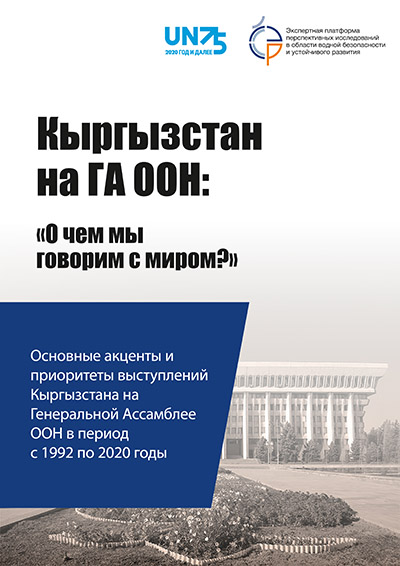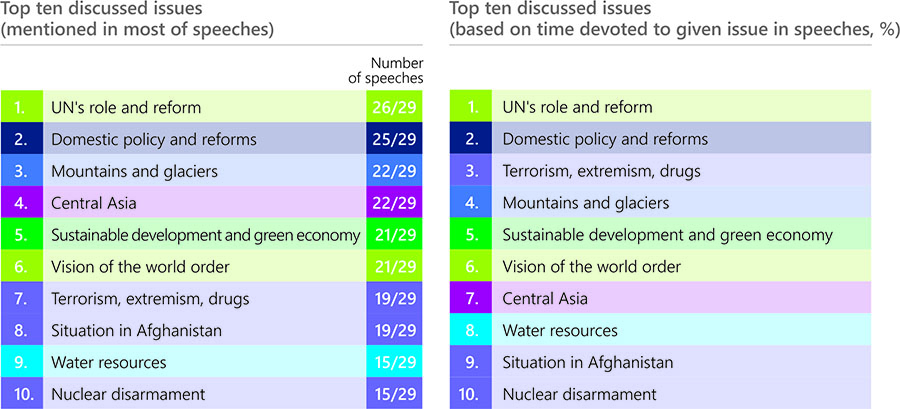Research
The Kyrgyz Republic at the UN General Assembly: Highlights of the statements made at the general debates from 1992 till 2020
Authors: D. Ziganshina, A. Galustyan, D. Abasova
Experts from Kyrgyz Republic: Ch. Uzakbaev, T. Neronova, S. Krivoruchko
Information collection: I. Belikov
Design: A. Degtyaryova
Prepared as part of the UNECE Project “Support to the Network of Russian Speaking Water Management Organizations” financed by the Government of the Russian Federation”
© UNECE, SIC ICWC, authors
In late 2020 - early 2021, on the occasion of the UN 75th anniversary, members of the Expert Platform made a review of speeches of Central Asian countries at general debates of the UN General Assembly over the period from 1992 to 2020. The objective of this study is to identify what issues the countries have addressed from the main world tribune and what initiatives they have pushed forward. A summary of Kyrgyzstan's speeches review is given below.

“One of mottos of the Kyrgyzstan’s foreign policy is that small countries must have big friends.” The UN is among such a trusted friend for Kyrgyzstan (59/2004). Thus, greater attention in Kyrgyzstan’s speeches during the UNGA general debates was paid to UN’s role and reform. Among the most frequently addressed issues also were domestic policy and reforms, with the focus on democracy, rule of law, anti-corruption, and gender equality.

Almost all initiatives brought by the Kyrgyz Republic at the UNGA had to deal with the country’s particular focus on the needs of mountain regions. The Republic underlined socio-economic difficulties that mountain regions face and the need for a global program of actions for sustainable development of highland countries. Over the years the Kyrgyz Republic put forward a range of initiatives, including debt for sustainable development swaps for mountain countries and the remediation of uranium tailings – another key concern of Kyrgyzstan. At the 75th anniversary session, a draft resolution was suggested for transboundary cooperation as the key factor of biodiversity conservation and sustainable use.
Kyrgyzstan, as a main freshwater supplier in Central Asia, underlines that water is the main strategic resource for the country’s green development. Regarding water sharing in the region, the Republic states about its interest in the development of water-energy potential and suggest its approaches to water cooperation.
Kyrgyzstan concerned about climate change and associated glacier melting, mountain ecosystem degradation, river runoff variations, more frequent disasters and other emergencies. Global climate change, which already has negative effects on Central Asia and in conjunction with other factors increases tensions and conflicts globally, is considered as one of the main threats for sustainable development.
Kyrgyzstan frequently addressed the processes undergoing in Central Asia, while supporting key initiatives of its neighbors on nuclear disarmament (Uzbekistan) and formation of the collective security system in Asia (Kazakhstan). It suggested building trust and cooperation and establishing a dialogue platform that would bring together the five Central Asian countries for sustainable development and security in the region.
The situation in Afghanistan and related threats of terrorism, extremism and drugs were not left aside. Kyrgyzstan supported the anti-terrorist coalition in Afghanistan through the transit center in the international Manas airport and expressed its readiness to expansion of trade and economic ties and export of power to Afghanistan under the CASA-1000.
Thematic priorities by decade






Key initiatives put forward by Kyrgyzstan at UN GA
- Adopt a Universal Convention on Freedom of Religion and Belief (48/1993)
- Proclaim the Year 2002 as the International Year of Mountains (52/1997, 53/1998)
- Initiated a number of resolutions on mountain development (55/200), 58/2003, 59/2004, 60/2005, 62/2007, 64/2009, 66/2011, 68/2013)
- Establish a special UN committee on restoration of peace and stability in Afghanistan (56/2001)
- Give an international status to 2200-years of Kyrgyz nationhood (57/2002)
- Declare February 20 as the World Justice Day (62/2007)
- Joint initiative of the CA countries on the role of international community in preventing radiation hazard in CA (64/2009)
- Establish a development fund to assist landlocked developing countries (69/2014)
- Create a dialog platform of the five Central Asian countries (70/2015)
- Hold the World Nomad Games on a periodic basis (71/2016)
- New draft resolution: “Nature transcends boundaries: transboundary cooperation – a key factor of biodiversity conservation and sustainable use” (75/2020)
Concerning water resources, in most speeches it was stressed that Kyrgyzstan is one of glacier keepers and freshwater suppliers in the region. Starting from 2009 Kyrgyzstan has been addressing water in connection with energy issues and stated its interest in hydropower development as a clean development mechanism. On water cooperation, the Republic stated that the issues related to water sharing in Central Asia can and should be dealt by the region’s countries themselves through an open dialog and with account of interests and needs of all the parties. Kyrgyzstan also supported implementation of integrated water resources management and the adoption of mutually beneficial economic mechanisms in Central Asia.

Experts’ views
Experts found it difficult to name explicitly successes of the Kyrgyz diplomacy at UNGA. On the one hand, the major success was the recognition of the Kyrgyz Republic’s sovereignty by international community and its membership in the UN since 1992. On the other hand, due to domestic political instability and frequent change of national government in Kyrgyzstan, it was difficult to achieve meaningful results in its foreign policy. However, among successful initiatives experts name mainstreaming of integrated mountain development and the initiative on environmental issues related to uranium heritage and the adoption of four Kyrgyzstan-promoted UNGA resolutions. One of them – the declaration of February 20 as the World Justice Day – is the Kyrgyz diplomacy’s contribution to overcoming social injustice.
Kyrgyzstan raised concerns about different economic, environmental, social, geopolitical and technological risks. In experts’ opinion, the Kyrgyz diplomacy should strengthen its position in the coverage of current and future environmental (mountains development, protection of glaciers and river runoff formation sources, etc.) and social risks, as well as those related to current geopolitical changes and over-spreading digitization. These risks could underlie joint initiatives of Central Asian countries. The COVID-19 outbreak disclosed domestic social problems in Kyrgyzstan related to healthcare, low living conditions, deteriorating education and unemployment. Environmental and climate change problems and, as a consequence, growing natural disasters may aggravate social conditions in the country. Thus, these problems need to be addressed at the international level.
Experts recommend that Kyrgyzstan pay more attention to adaptation to climate change and transboundary environmental and water cooperation. Particular focus should be put on water-energy issues that become the cornerstone of political relations between the countries in the region. Experts note that, despite promotion from the UN’s tribune of a need to develop hydropower and expression of interest in region-wide projects, Kyrgyzstan rashly ceased its membership in regional organizations that were to seek for joint solutions.
Economic risks also need to be covered but to a lesser degree. Economic problems must be solved through good strategies that have not been implemented yet. Experts think that country’s economic policy cannot rely on grants or loans only. This leads to accumulation of foreign debt.
Experts recommend for future speeches at the UNGA to voice such measures that will meet country’s own interests and do not oppose the interests of all countries, enhance the positive image of Kyrgyzstan on the global stage and can be brought into effect. It is necessary to build capacity of foreign office staff and take concrete actions for addressing regional challenges and implementing agreements to deepen the relationships in all political and economic spheres.
It is proposed to put forward ideas of sharing the region’s water-energy potential and joining forces in development of programs and measures to fight climate change and also act together for development of a common green economy model in the region. In this context, Kyrgyzstan may put forward an initiative on the establishment of a special UN sub-regional organization. Moreover, provision of its territory and resources for geopolitical tasks of extraterritorial organizations, such as OSCE, NATO and others seems questionable.
 Ch. Uzakbayev:
Ch. Uzakbayev:
“Once, upon initiative of Kazakhstan, IFAS has got an observer status in the UN. Why the region’s diplomats do not push forward this very important matter for the region for IFAS to become a full member-organization of the UN? I propose to put forward ideas of sharing the region’s water-energy potential and joining forces in development of programs and measures to fight climate change and also act together for development of a common green economy model in the region”.
 T. Neronova:
T. Neronova:
“For me, as an expert in environment and water management, it would be nice if Kyrgyzstan pays more attention to adaptation to climate change and to transboundary cooperation on environment and water”.
 S. Krivorutchko:
S. Krivorutchko:
“It is important to give coverage to the risks related to ongoing geopolitical change as well as the risks and problems related to extensive expansion of digitization”.


